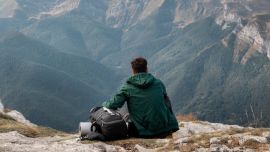Ravaged by drought, the Paraná Delta in Argentina, one of the largest and most biodiverse areas in the world, has been burning like never before since the beginning of the year.
During the first seven months of 2020, more than 11,000 fires were detected in the 14,000 square kilometre (5,400 square mile) region, according to the Antonio Scasso Museum of Natural Sciences.
More than 530 square kilometres of marshland – an area equivalent to three times Argentina's sprawling capital Buenos Aires, which lies to the southeast – has been razed, according to estimates based on satellite images.
The flames are devastating the rich biodiversity of a territory that is home to 700 species of plants and animals, according to the National Rosario and Littoral universities.
"The fires generate an immediate impact and others that are felt over the medium and long term: the death of animals, the loss of the natural habitat of many species, impoverishment of the soil, water and air contamination, emissions that generate climate change," Graciela Klekailo, from Rosario University, told AFP.
The delta is a flood plain made up of several islands where the Paraná River empties into the Rio de la Plata.
Livestock producers accused
The question on everyone's mind, though, is who is responsible?
Environment Minister Juan Cabandié accuses livestock producers of using fire to clear dry pastureland and regenerate it for their livestock.
The official has filed a criminal complaint against producers and land tenants. But those producers deny the accusations and claim the fires undermine their activities, in turn blaming authorities for "lack of control and neglect."
Jorge Postma, from Rosario University, says this year's exceptional conditions have caused the catastrophe.
The Paraná River – whose name means little sea in the local Guarani language – is much lower than normal.
"Right now the level of the Paraná River in the Rosario port hydrometer is 80 centimetres. Normally in this area at this time of year it's three or four metres," said Postma.
'Heartbroken'
Javier Torres belongs to a family in the city of Entre Ríos that has produced honey for decades.
This year, 270 bee hives in the Delta's island areas were devoured by fire.
"It took years to build and will take me years to rebuild. I'm heart- broken. I haven't received any help from anyone so far," Torres told AFP.
Depending on the direction of the wind, the largest coastal cities on the western bank of the Paraná, such as Rosario, San Lorenzo and Villa Constitución, are engulfed by a dense cloud of smoke that causes breathing problems and allergies.
It's made all the worse by the coronavirus pandemic.
In June, Rosario University researchers found that the city's air had five times the allowed level of pollution.
"This is very serious in the context of a pandemic, with breathing issues," the researchers wrote.
'Little Amazon'
While livestock rearing is the main activity in the Delta area, it also attracts poachers, fishermen and real estate speculators.
Pablo Cantador, an environmentalist from the "Don't Touch Paraná" group, told AFP that the uncontrollable fires "are the result of decades of forgetting about the marshes."
A group of universities and environmental organisations is clamouring for Congress to urgently pass a bill aimed at protecting the marshland.
They say the new law would create greater regulations regarding the use of the land and protect the Delta.
However, it has already failed twice to win passage in the legislature.
"It's the most important marsh system in Argentina. Here we call it our little Amazon," said Laura Prol, from the Ecologist Workshop, who is demanding action by authorities.
related news
by Jorgelina Hiba, AFP


























Comments